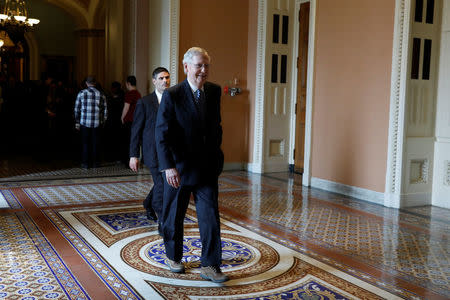Republicans weigh changes to health bill as doubts mount
By Susan Heavey and Susan Cornwell WASHINGTON (Reuters) - President Donald Trump and congressional leaders are weighing changes to their plan to dismantle the Obamacare health law, a White House spokesman said Tuesday, as Republicans defended their effort following an estimate that it would cause 14 million Americans to lose insurance next year. Press Secretary Sean Spicer said White House officials and leaders in the Republican-controlled U.S. House of Representatives were considering whether to tweak their bill, which faces growing doubts within party ranks. The nonpartisan U.S. Congressional Budget Office (CBO) on Monday estimated that by 2026, the plan would boost the number of people without health insurance by 24 million. Those findings prompted a few Republican defections and made it tougher for the Republican president to sell his first major piece of legislation. Trump hopes to deliver on a longtime pledge by his political party to undo Democratic former President Barack Obama's signature domestic policy achievement. Trump spoke by phone on Tuesday with House Speaker Paul Ryan and with Joseph Swedish, chief executive of managed care company Anthem Inc. He also has hosted Republicans at the White House recently. "Part of the reason we are engaging with these individuals is to hear their ideas," Spicer said. "We are obviously in talks with House leadership about the contents." The debate comes as voter interest in the issue rises. Healthcare was a top priority for Americans, according to a Reuters/Ipsos poll of 1,747 people in March. Sixteen percent picked healthcare as their No. 1 issue, compared with 14 percent for the economy and 11 percent who chose terrorism. It was the first time healthcare topped the list since the poll started in 2012. The poll has a credibility interval, a measure of accuracy, of 3 percentage points. Republicans' plan to replace the 2010 Affordable Care Act, popularly known as Obamacare, would repeal a penalty against Americans who do not buy health insurance and slash spending on the Medicaid program for the poor and disabled. It would also revamp tax subsidies that help people buy insurance if they do not get it from work. The amounts would be based on age, not income. Democrats say the Republican plan would hurt the elderly, the poor and working families but give tax cuts to the rich. Doctors, hospitals and advocates for patients and senior citizens also have panned it. After the CBO report, some House Republicans pulled support. Representative Leonard Lance of New Jersey, who said the report "modified the dynamic," said the bill could not pass the Senate. Representative Ileana Ros-Lehtinen, who is from south Florida, tweeted: "As written the plan leaves too many from my district uninsured." Spicer said the CBO struggles to estimate insurance coverage. Before the 2010 law passed, the office projected more people would buy individual insurance plans through new online marketplaces than actually did. The White House has, however, promoted the CBO's estimate of the plan's effect on federal deficits. The report said it would cause deficits to fall by $337 billion between 2017 and 2026. CHANGES POSSIBLE Trump's administration must heal divisions in his party. Moderates, particularly in the Senate, worry about causing people to lose coverage, while conservatives do not think the bill goes far enough in undoing Obamacare. House leaders have resisted a conservative push to bring a quicker end to Obamacare's expansion of Medicaid. But they are considering changes to tax credits to help older, lower-income Americans. The CBO said that group could see higher premiums because the Republican plan would let insurers charge older enrollees more than they can under Obamacare. "We're examining different options for how we can improve that," Representative Kevin Brady, who heads a key tax-writing committee, said on Tuesday, without providing details. Republican senators had lunch on Capitol Hill with Vice President Mike Pence and Health and Human Services Secretary Tom Price to discuss possible changes. Majority Leader Mitch McConnell said the bill could be amended in the Republican-controlled Senate. SHARES FALL Shares of hospitals and health insurers slipped, partly on worries the plan would mean fewer insured patients. Among insurer stocks, UnitedHealth Group Inc closed down 0.7 percent, and Aetna Inc and Humana Inc each dipped 0.5 percent. “It looks like it's going to be the dismantling of the individual insurance market, which again means lower revenues,” said Vishnu Lekraj, an equity analyst at Morningstar. Hospital shares were also lower. Tenet Healthcare Corp finished down 3.3 percent and HCA Holdings Inc ended down 1.5 percent. (Additional reporting by Caroline Humer, Alistair Bell, Chris Kahn, David Morgan, Mike Erman and Natalie Grover; Writing by Emily Stephenson; Editing by Jeffrey Benkoe and Jonathan Oatis)

 Yahoo News
Yahoo News 




